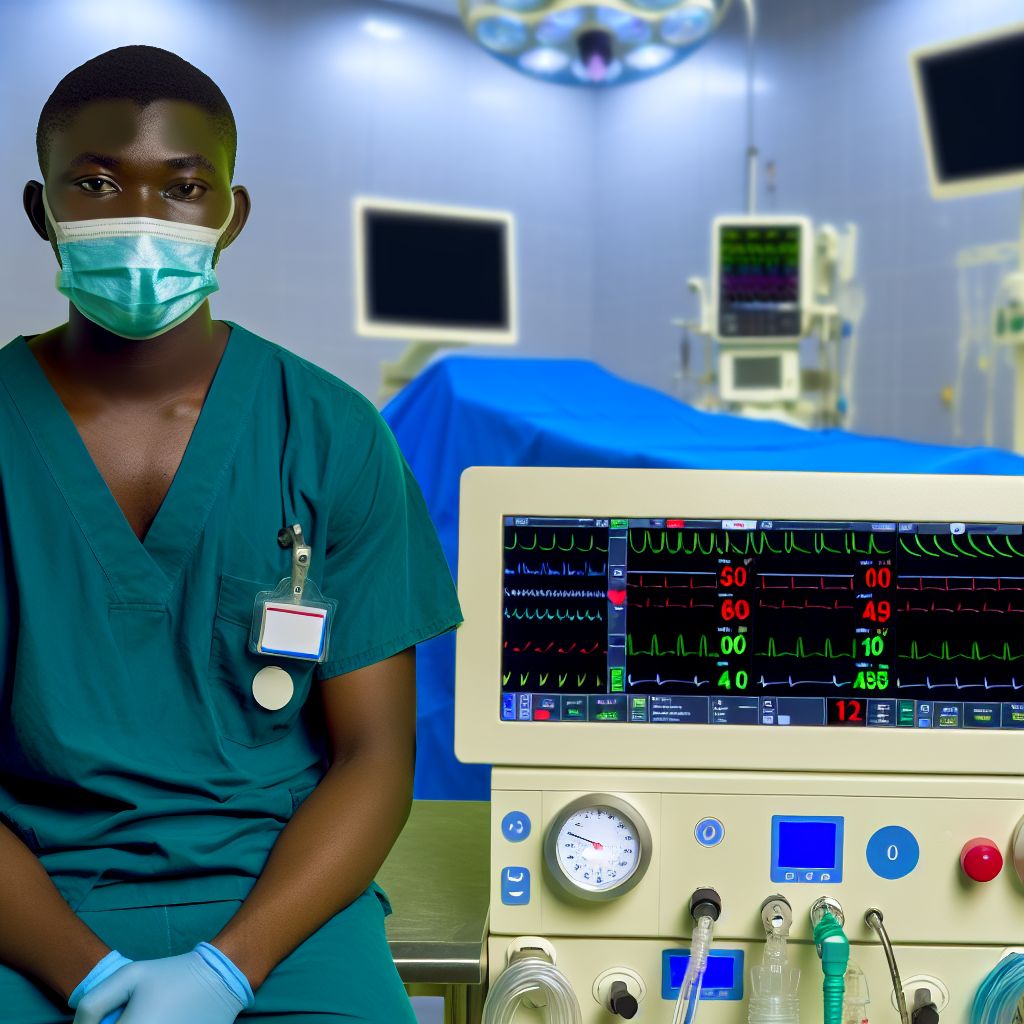Introduction:
Anaesthesiologists play a critical role in Nigeria’s healthcare system.
They ensure patient comfort and safety during surgical procedures.
However, there is a shortage of skilled anaesthesiologists in the country.
This poses a significant challenge to the delivery of quality healthcare services.
Purpose of the Blog Post:
This blog post aims to highlight key skills essential for Nigerian anaesthesiologists.
These skills are needed to address the current shortage.
They will also improve the overall quality of anaesthesia care in the country.
Strong Medical Knowledge:
Nigerian anaesthesiologists must have a solid understanding of medical principles.
This understanding is critical to effectively administer anaesthesia.
They also need to manage patients’ critical conditions.
Critical Thinking and Problem-Solving Skills:
Quick thinking is crucial for anaesthesiologists in Nigeria.
They must make sound decisions in high-pressure situations.
Excellent Communication Skills:
Anaesthesiologists need to communicate effectively with patients.
They must also liaise with surgical teams and other healthcare professionals.
This ensures proper care and coordination during procedures.
Attention to Detail:
Small details can significantly affect patient outcomes.
Nigerian anaesthesiologists must be meticulous in their approach.
Adaptability and Flexibility:
The dynamic nature of healthcare settings in Nigeria requires adaptability.
Anaesthesiologists must handle unexpected challenges with ease.
Education and Training Requirements:
When it comes to becoming an anaesthesiologist in Nigeria, there are specific education and training requirements that individuals must meet to practice in this medical field.
Necessary Qualifications and Certifications:
- Completion of a Bachelor’s degree in Medicine and Surgery from a recognized medical school.
- Must be registered with the Medical and Dental Council of Nigeria (MDCN).
- Passing the Primary Fellowship Examination of the West African College of Surgeons (WACS).
- Attaining the Fellowship of the National Postgraduate Medical College of Nigeria (NPMCN) in Anaesthesia.
Medical Training and Residency Programs:
- After completing medical school, aspiring anaesthesiologists must undergo a residency program in Anaesthesia.
- The residency program typically lasts for a minimum of four years in accredited teaching hospitals.
- During the residency, individuals receive hands-on training in various aspects of anaesthesia practice.
- They work under the supervision of experienced anaesthesiologists to gain practical skills.
Importance of Continuing Education:
- As the field of medicine is constantly evolving, it is crucial for anaesthesiologists to engage in continuing education.
- Attending conferences, workshops, and seminars helps them stay updated on the latest medical advancements.
- Continuing education ensures that anaesthesiologists provide the highest quality of care to their patients.
- It also allows them to enhance their skills, learn about new technologies, and improve patient outcomes.
Education, training, and ongoing learning are essential components for Nigerian anaesthesiologists to excel in their profession and provide top-notch care to patients.
Clinical Skills
Anaesthesiologists in Nigeria require a wide range of clinical skills to effectively carry out their responsibilities.
These include:
- Proficiency in administering anesthesia
- Accurate monitoring of patient vitals
- Effective management of pain during surgeries
The ability to respond quickly to emergencies and handle critical situations is crucial for anaesthesiologists in Nigeria.
They must be able to think on their feet and make rapid decisions to ensure patient safety.
Administering anesthesia is a delicate procedure that requires precision and skill.
Anaesthesiologists must carefully calculate the dosage and choose the appropriate type of anesthesia for each patient based on their medical history and the type of surgery being performed.
Monitoring patient vitals is another key clinical skill for anaesthesiologists in Nigeria.
They must be able to interpret data accurately and respond promptly to any deviations from normal values.
This requires attentiveness and a keen eye for detail.
Managing pain during surgeries is essential for patient comfort and successful outcomes.
Anaesthesiologists must have a thorough understanding of pain management techniques and be able to adjust their strategies based on individual patient needs.
Furthermore, the ability to respond quickly to emergencies is a critical skill for anaesthesiologists.
In high-pressure situations, they must remain calm and focused, making swift decisions to stabilize patients and prevent complications.
Clinical skills are essential for anaesthesiologists in Nigeria to provide safe and effective care to patients undergoing surgical procedures.
Mastery of these skills is vital for ensuring positive outcomes and maintaining high standards of patient care.
Learn More: Regulation and Licensing of Physiotherapists in Nigeria
Communication Skills:
Anaesthesiologists must possess excellent communication skills to effectively interact with patients, surgeons, and other healthcare professionals in their daily practice.
- Effective communication with patients is crucial as it helps build trust, alleviate fears, and ensure informed consent for procedures.
- Clear and concise instructions are essential, especially in high-pressure situations such as emergencies or urgent surgeries.
- Communication with surgeons is vital for coordinating anaesthesia plans, addressing concerns, and ensuring patient safety during procedures.
- Collaborating with other healthcare professionals requires good communication skills to provide comprehensive care to patients.
- As educators, anaesthesiologists play a key role in informing patients about anaesthesia options, risks, benefits, and post-operative care.
- Managing patient expectations is critical, and clear communication can help patients understand their role in the anaesthesia process.
- Anaesthesiologists also need to communicate effectively with their anaesthesia team to ensure smooth workflow and patient care.
Strong communication skills are essential for Nigerian anaesthesiologists to provide high-quality care, promote patient safety, and facilitate effective teamwork in the healthcare setting.
Discover More: Path to Becoming an Optometrist in Nigeria
Transform Your Career with Expert Guidance
Get personalized mentorship consulting that’s tailored to your unique path. Our expert advice is actionable and exclusive.
Get StartedCritical Thinking and Problem-Solving
Anaesthesiologists need to think quickly and make sound decisions in challenging situations.
The ability to anticipate potential complications and develop contingency plans is crucial.
Analyzing data and adjusting treatment plans as needed is important for successful outcomes.
In the field of anaesthesiology, critical thinking and problem-solving skills are indispensable.
Anaesthesiologists often face complex and high-pressure situations where quick decision-making can mean the difference between life and death.
It is essential for anaesthesiologists to possess the ability to think critically and solve problems effectively to provide the best possible care for their patients.
One of the key aspects of critical thinking in anaesthesiology is the ability to anticipate potential complications.
Anaesthesiologists must assess the situation, identify potential risks, and develop contingency plans to address any issues that may arise.
By thinking ahead and planning for various scenarios, anaesthesiologists can better prepare themselves to handle unexpected challenges during procedures.
Moreover, analyzing data plays a significant role in the decision-making process for anaesthesiologists.
By carefully examining patient information, test results, and other relevant data, anaesthesiologists can develop a comprehensive understanding of the patient’s condition.
This data-driven approach allows anaesthesiologists to make informed decisions and adjust their strategies as needed to ensure the best possible outcomes for their patients.
Critical thinking and problem-solving skills are essential for anaesthesiologists in Nigeria.
By thinking quickly, anticipating complications, and analyzing data effectively, anaesthesiologists can navigate challenging situations with confidence.
This enables them to provide optimal care for their patients.
Uncover the Details: Stigma Around Mental Health in Nigerian Society
Attention to Detail:
In the field of anesthesia, attention to detail is a fundamental skill that can greatly impact patient care and outcomes.
Anesthesiologists must pay close attention to various aspects of their practice to ensure the safety and well-being of their patients.
When it comes to patient information, medical histories, and medication dosages, being meticulous is not just a good practice – it is a necessity.
Anesthesiologists need to carefully review and understand each patient’s unique medical background to make informed decisions about anesthesia administration.
Recording and documenting patient responses to anesthesia is another area where attention to detail is critical.
Anesthesiologists must accurately and comprehensively document how patients react to different types of anesthesia to adjust their treatment plans accordingly.
Moreover, meticulousness is crucial in ensuring patient safety during procedures.
By paying attention to the smallest details, anesthesiologists can prevent potential complications and adverse events, leading to successful outcomes for their patients.
Attention to detail is a key skill that all Nigerian anesthesiologists must possess.
It is the foundation for providing safe, effective, and high-quality care to patients undergoing anesthesia.
By being thorough and precise in their practice, anesthesiologists can improve patient outcomes and contribute to overall healthcare excellence in Nigeria.
- Emphasizing the significance of paying close attention to patient information, medical histories, and medication dosages is crucial.
- Discussing the need for accuracy in recording and documenting patient responses to anesthesia is essential for proper care.
- Mentioning the importance of meticulousness in ensuring patient safety and successful outcomes cannot be overstated.
You Might Also Like: Childhood Immunization Schedule in Nigeria

Emotional Intelligence and Empathy
Being empathetic and compassionate towards patients is crucial in anesthesia practice.
- As anesthesiologists, we need to provide emotional support during the stressful period of surgery.
- Empathy helps alleviate fears and anxieties, creating a more comforting environment for patients.
- Building trust and rapport with patients and their families is essential for effective care.
Empathy allows us to understand the emotions and feelings of patients, which can enhance the overall patient experience.
By being emotionally intelligent, anesthesiologists can better communicate with patients and address their concerns.
- Emotional intelligence helps in managing patient expectations and ensuring they feel heard and understood.
- It enables anesthesiologists to navigate difficult situations with sensitivity and empathy.
- Patients are more likely to trust healthcare providers who demonstrate emotional intelligence.
In moments of vulnerability, patients seek reassurance and comfort from their healthcare providers.
Empathy and emotional intelligence play a significant role in providing this support.
- Patients feel valued when their emotions are acknowledged and validated by their anesthesiologist.
- Empathy can help ease the stress and anxiety patients may experience before undergoing surgery.
- It fosters a compassionate and understanding relationship between healthcare providers and patients.
Emotional intelligence and empathy are key skills that every Nigerian anesthesiologist should possess.
Teamwork and Collaboration:
Working collaboratively with surgeons, nurses, and healthcare professionals is crucial.
- Clear communication is key to ensuring the smooth flow of operations.
- Respect for each team member’s role is essential for a harmonious environment.
- Cooperation among team members leads to efficient and effective patient care.
Effective teamwork in the operating room is vital for successful surgical outcomes.
Collaboration between anesthesiologists and surgeons is essential for patient safety.
Proper communication before, during, and after surgery minimizes the risk of errors.
Respecting each other’s expertise and opinions fosters a culture of trust.
Teamwork allows for the exchange of ideas and perspectives to improve patient care.
Working together in a multidisciplinary team enhances overall clinical outcomes.
Collaborating with nurses ensures that patient needs are met promptly and effectively.
Successful anesthesia delivery requires coordination between all healthcare team members.
Joint efforts among healthcare professionals lead to better patient outcomes and satisfaction.
Teamwork not only benefits patients but also contributes to the professional growth of individuals.
Key Skills for Nigerian Anaesthesiologists
As Nigerian anaesthesiologists, the key skills required include strong communication, critical thinking, and decision-making abilities.
Continuous learning is essential to stay updated with advancements in anaesthesia techniques.
Professionalism and ethical conduct are paramount in patient care.
Providing patient-centered care should be the ultimate goal for every anaesthesiologist.
Empathy, compassion, and sensitivity are crucial in interacting with patients.
Aspiring anaesthesiologists should focus on developing and enhancing these skills to deliver high-quality healthcare services in Nigeria.
Embracing a culture of learning and improvement will benefit both the healthcare provider and the patient.
Additional Resources
Surgical Capacity in Rural Southeast Nigeria: Barriers and New …
Original research: Assessing the inclusion of children’s surgical care …




